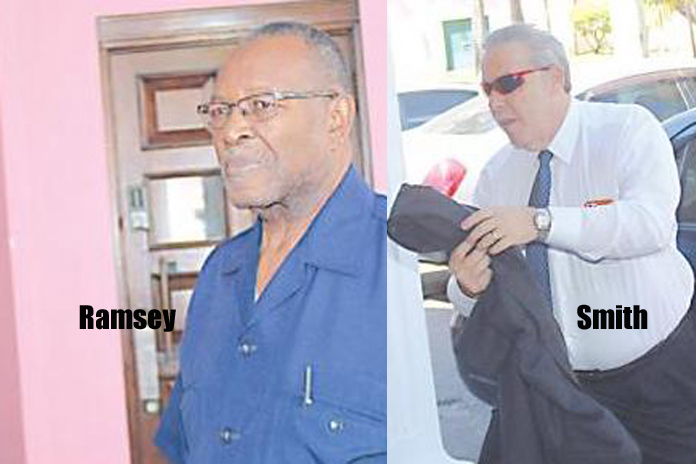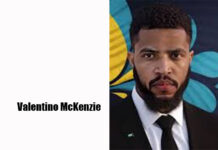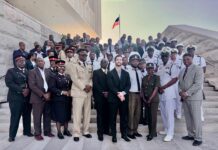Alstom wrote letters to then Prime Minister Ingraham and Deputy PM Frank Watson while bidding and consultations were underway…

Artesia Davis
Nassau Guardian Senior Reporter
NASSAU, Bahamas — Fred Ramsey used his access to former deputy prime minister Frank Watson to ensure that Alstom Power Espana, formerly ABB Generación, received a second contract for the expansion of the Bahamas Electricity Corporation’s (BEC) generation capacity, a Supreme Court jury in Nassau heard on Wednesday.
Ramsey, an opposition Free National Movement (FNM) council member and former member of BEC’s board and contracts committee, is accused of bribery in connection with payments totaling hundreds of thousands of dollars that he allegedly received to influence the board’s decision to award the contract to Alstom.
Ramsey has denied any wrongdoing at his trial before Justice Bernard Turner.
Alstom was ultimately given the contract after the board had voted in favour of its Korean competitor, Hansang, after Watson suspended the award of the contract while he “investigated” concerns brought to his attention by Ramsey, the court heard.
Watson’s alleged involvement in the contract award was detailed in an invoice to Alstom made up by Ramsey’s uncharged alleged co-conspirator Mark Smith, of Littleton, Colorado.
Smith continued his second day of testimony on Wednesday.
Smith billed the company (Alstom) for $192,726.77 as the first installment of a commission owed to him and Ramsey for securing the contract for Alstom, the court heard.
According to the invoice on November 17, 2001, the final vote of the board was in “favour of the competitor”.
The notation of the invoice said, “We then met with DPM Watson, who began an investigation and told BEC not to award the contract until he met with Cabinet members. BEC was informed to give the contract to Alstom.”
The award of the contract was delayed due to the investigation, but it was awarded on March 1, 2001, the court heard.
Smith said that his company, M. Smith Inc., entered a consultancy agreement with Alstom to channel information to the company regarding the tender process.
The court heard that the first consultancy agreement to ensure that Alstom got the contract for the first power extension phase was handled by Burnside International, a company owned by Smith’s father, Ted Smith, who died in 1999.
Smith alleged that Alstom paid $600,000 in kickbacks that was split equally between the Smiths and Ramsey.
Smith said, “I was basically a go-between. They wanted to distance themselves from Fred.”
He said Alstom sent him a draft agreement, but he had misgivings signing it because clause 7.2 forbade paying government officials.
Smith said he told Marco Contin (an Alstom official) that the agreement would “fall under the bribery kickback clause”.
He said he was told that the clause was necessary to comply with OECD requirements.
Smith said he voiced his concerns to Ramsey, who allegedly said, “I’ll probably be off the board of directors by then. We’re business partners and the money will go to M. Smith Inc.”
Smith said, “So since everyone seemed in agreement, I signed it.”
Despite affixing his signature, there was a delay in finalizing the contract, the court heart.
Smith wrote the company, “Fred is to oversee the opening of the tender. We have everything in place; we have no contract. We will not go any further until we have the contract. All we want is a simple contract. When we win the bid, we make our commission.”
Acting Director of Public Prosecution Garvin Gaskin asked, “When you say we, who do you mean?”
Smith replied, “Myself and Fred.”
In addition to appealing to government contacts, Smith and Ramsey allegedly met with Alstom official Jose Rodriguez to “discuss questions so Alstom would come across as the best contender”.
Ramsey kept “making Alstom to be the best choice” and during a subcommittee meeting he said that “consultants were not doing a just evaluation”.
Ramsey allegedly advised Abel Santamaria (another Alstom official) to “drop all conditions as the board was looking for any excuse to award the contract to the competitor”.
Once Smith got the consultancy contract, he forwarded his bank account information to Alstom.
Based on information supplied by Ramsey, Alstom learned that the board was favouring its Korean competitor, the court heard.
As a result, Alstom officials wrote to former prime minister Hubert Ingraham in September 2000 saying, “We are not convinced if the evaluation was done correctly.”
The letter claimed that the rival company did not have the capacity to complete the project within the set timeframe.
In December 2000, Alstom wrote to BEC’s board. In that communication, Santamaria said that “sources” had informed him that Hansang was being considered for the contract.
Santamaria said that the Korean company had a “construction delay risk” as the crankshaft for the engine had not been made.
Santamaria also noted that there was no guarantee that the parts on the engine would be compatible with the first engine that was produced by Alstom during the first phase of the extension program.
Days later, BEC’s board wrote Alstom warning that it “wanted no further communication”.
The board said seeking “to unfairly influence the tender application” was in contravention of the tender application agreement.
Asked by Gaskin if he was paid per the consultancy agreement, Smith confirmed that he was.
He said that an initial payment of $192,726.77 was wired to his account and a check of $56,601.37 was made out to Ramsey.
Wayne Munroe QC questioned Smith about the lack of supporting documents for the alleged payments.
Smith said the documents that he had were provided in compliance with a subpoena from the US Department of Justice.
Munroe asked, “Was a warrant executed on you? Were boxes of documents taken away?”
Smith replied, “No, they didn’t physically come.”
Munroe continued, “So they relied on your attorneys to produce the records?’
Smith said, “I directed my attorneys to provide what the Department of Justice wanted.”
Smith was due to continue his evidence on Thursday.









